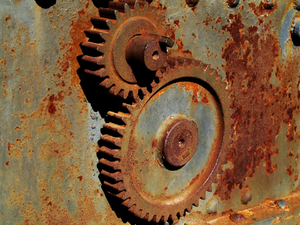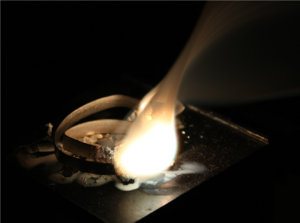Difference between revisions of "Oxidation"
(→Examples) |
(→About Oxidation) |
||
| (10 intermediate revisions by 2 users not shown) | |||
| Line 6: | Line 6: | ||
: [[Oxidation]] can happen very slowly at low [[temperature]]s. | : [[Oxidation]] can happen very slowly at low [[temperature]]s. | ||
: Both [[Metal]]s and [[Non-metal]]s can be '''oxidised'''. | : Both [[Metal]]s and [[Non-metal]]s can be '''oxidised'''. | ||
| − | : [[Metal Oxide]]s are [[Base|basic]], while [[Non-metal Oxide]]s are [[acid]]ic. | + | : [[Metal Oxide]]s are [[Base|basic]], while [[Non-metal Oxide]]s are [[acid]]ic when [[dissolve]]d in water. |
: When [[Iron]] is '''oxidised''' it is said to be [[rust]]ing. | : When [[Iron]] is '''oxidised''' it is said to be [[rust]]ing. | ||
| Line 14: | Line 14: | ||
| style="height:20px; width:300px; text-align:center;" |'''Burning''' | | style="height:20px; width:300px; text-align:center;" |'''Burning''' | ||
|- | |- | ||
| − | |[[File:RustingGears.png|center| | + | |[[File:RustingGears.png|center|300px]] |
|[[File:MagnesiumRibbon.png|center|300px]] | |[[File:MagnesiumRibbon.png|center|300px]] | ||
|- | |- | ||
| Line 21: | Line 21: | ||
|- | |- | ||
|} | |} | ||
| + | |||
| + | ==Key Stage 4 Foundation== | ||
| + | ===Meaning=== | ||
| + | '''Oxidation''' is when a [[metal]] gains one or more [[Oxygen]] [[atom]]s to become a [[Metal Oxide|metal oxide]]. | ||
| + | |||
| + | ===About Oxidation=== | ||
| + | : [[Oxidation]] takes place in [[Displacement Reaction|displacement reactions]] involving [[Metal Oxide|metal oxides]]. | ||
| + | In the following '''redox reaction''': | ||
| + | : [[Aluminium]] + [[Iron Oxide]] → [[Aluminium Oxide]] + [[Iron]] | ||
| + | |||
| + | <math>2Al+Fe_2O_3 \rightarrow Al_2O_3+2Fe</math> | ||
| + | |||
| + | The [[Aluminium]] is [[Oxidation|oxidised]] because it gains the [[Oxygen]] [[atom]]s. | ||
| + | |||
| + | ==Key Stage 4 Higher== | ||
| + | ===Meaning=== | ||
| + | '''Oxidation''' is when a [[metal]] loses [[electron]]s to become a [[Positive Ion|positive ion]]. | ||
| + | |||
| + | ===About Oxidation=== | ||
| + | : '''Oxidation''' takes place in [[Displacement Reaction|displacement reactions]]. | ||
| + | In the following '''redox reaction''': | ||
| + | : [[Magnesium]] + [[Copper (II) Chloride]] → [[Magnesium Chloride]] + [[Copper]] | ||
| + | : [[Oxidation]] of [[Magnesium]]: <chem>Mg - 2e^- -> Mg^2+</chem> | ||
| + | The [[Magnesium]] is [[Reduction|reduced]] because it loses [[electron]]s. | ||
| + | |||
| + | ===References=== | ||
| + | ====AQA==== | ||
| + | |||
| + | :[https://www.amazon.co.uk/gp/product/0008158762/ref=as_li_tl?ie=UTF8&camp=1634&creative=6738&creativeASIN=0008158762&linkCode=as2&tag=nrjc-21&linkId=a0fffa35b3ea49a63404f6704e0df7cc ''Oxidation, of alcohols, page 243, GCSE Chemistry; Student Book, Collins, AQA ''] | ||
| + | :[https://www.amazon.co.uk/gp/product/1782945598/ref=as_li_tl?ie=UTF8&camp=1634&creative=6738&creativeASIN=1782945598&linkCode=as2&tag=nrjc-21&linkId=ad276ad49df77ab4b40ab4fd0fe10131 ''Oxidation, page 130, GCSE Combined Science; The Revision Guide, CGP, AQA ''] | ||
| + | :[https://www.amazon.co.uk/gp/product/178294639X/ref=as_li_tl?ie=UTF8&camp=1634&creative=6738&creativeASIN=178294639X&linkCode=as2&tag=nrjc-21&linkId=51599bb45a2bfaf7c1b6a978b2ca2616 ''Oxidation, pages 137, 139, 140, GCSE Combined Science Trilogy; Chemistry, CGP, AQA ''] | ||
| + | :[https://www.amazon.co.uk/gp/product/1782945962/ref=as_li_tl?ie=UTF8&camp=1634&creative=6738&creativeASIN=1782945962&linkCode=as2&tag=nrjc-21&linkId=476bb5c8d1dfb5c08ac81b6d4d1c98d8 ''Oxidation, pages 162, 164, 165, 190, 191, GCSE Chemistry, CGP, AQA ''] | ||
| + | :[https://www.amazon.co.uk/gp/product/1782945571/ref=as_li_tl?ie=UTF8&camp=1634&creative=6738&creativeASIN=1782945571&linkCode=as2&tag=nrjc-21&linkId=9e29fad914244909903e5e93f8a01d199 ''Oxidation, pages 56-58, 65, GCSE Chemistry; The Revision Guide, CGP, AQA ''] | ||
| + | :[https://www.amazon.co.uk/gp/product/0198359381/ref=as_li_tl?ie=UTF8&camp=1634&creative=6738&creativeASIN=0198359381&linkCode=as2&tag=nrjc-21&linkId=47c8d1ae58d8b3a5e2094cd447154558 ''Oxidation, pages 87, 91, 104-105, 152-153, 163, 220-221, GCSE Chemistry; Third Edition, Oxford University Press, AQA ''] | ||
| + | :[https://www.amazon.co.uk/gp/product/0008158762/ref=as_li_tl?ie=UTF8&camp=1634&creative=6738&creativeASIN=0008158762&linkCode=as2&tag=nrjc-21&linkId=a0fffa35b3ea49a63404f6704e0df7cc ''Oxidation; gain of oxygen, pages 131-3, 235, GCSE Chemistry; Student Book, Collins, AQA ''] | ||
| + | :[https://www.amazon.co.uk/gp/product/0008158762/ref=as_li_tl?ie=UTF8&camp=1634&creative=6738&creativeASIN=0008158762&linkCode=as2&tag=nrjc-21&linkId=a0fffa35b3ea49a63404f6704e0df7cc ''Oxidation; loss of electrons, pages 138-9, 155, 157, 159, 161, 164-5, 182, GCSE Chemistry; Student Book, Collins, AQA ''] | ||
| + | |||
| + | ====Edexcel==== | ||
| + | |||
| + | :[https://www.amazon.co.uk/gp/product/1782945741/ref=as_li_tl?ie=UTF8&camp=1634&creative=6738&creativeASIN=1782945741&linkCode=as2&tag=nrjc-21&linkId=30da4f2178da182547b62a7329d13b57 ''Oxidation, pages 110, 114, 116, GCSE Combined Science; The Revision Guide, CGP, Edexcel ''] | ||
| + | :[https://www.amazon.co.uk/gp/product/1782948147/ref=as_li_tl?ie=UTF8&camp=1634&creative=6738&creativeASIN=1782948147&linkCode=as2&tag=nrjc-21&linkId=f63dcd8345f4e49c717b39a228a36c7c ''Oxidation, pages 146-148, 153, 181, 182, 216, 306, GCSE Chemistry, CGP, Edexcel ''] | ||
| + | :[https://www.amazon.co.uk/gp/product/1782945725/ref=as_li_tl?ie=UTF8&camp=1634&creative=6738&creativeASIN=1782945725&linkCode=as2&tag=nrjc-21&linkId=694be7494de75af3349537d34e13f7f0 ''Oxidation, pages 48, 52, 54, 64, GCSE Chemistry; The Revision Guide, CGP, Edexcel ''] | ||
| + | :[https://www.amazon.co.uk/gp/product/1292120215/ref=as_li_tl?ie=UTF8&camp=1634&creative=6738&creativeASIN=1292120215&linkCode=as2&tag=nrjc-21&linkId=8f96ddb76196848bafdb124354e4cf77 ''Oxidation, pages 66, 81, 87, 90-91, 98, 174, 182, GCSE Chemistry, Pearson, Edexcel ''] | ||
| + | :[https://www.amazon.co.uk/gp/product/1292120215/ref=as_li_tl?ie=UTF8&camp=1634&creative=6738&creativeASIN=1292120215&linkCode=as2&tag=nrjc-21&linkId=8f96ddb76196848bafdb124354e4cf77 ''Oxidation; OILRIG mnemonic, pages 66, 81, 133, GCSE Chemistry, Pearson, Edexcel ''] | ||
| + | |||
| + | ====OCR==== | ||
| + | :[https://www.amazon.co.uk/gp/product/1782945695/ref=as_li_tl?ie=UTF8&camp=1634&creative=6738&creativeASIN=1782945695&linkCode=as2&tag=nrjc-21&linkId=ceafcc80bcad6b6754ee97a0c7ceea53 ''Oxidation, page 116, Gateway GCSE Combined Science; The Revision Guide, CGP, OCR ''] | ||
| + | :[https://www.amazon.co.uk/gp/product/0198359829/ref=as_li_tl?ie=UTF8&camp=1634&creative=6738&creativeASIN=0198359829&linkCode=as2&tag=nrjc-21&linkId=90e8d7b4f039d53035238fa0320fe00b ''Oxidation, pages 110-111, 124, Gateway GCSE Chemistry, Oxford, OCR ''] | ||
| + | :[https://www.amazon.co.uk/gp/product/1782945679/ref=as_li_tl?ie=UTF8&camp=1634&creative=6738&creativeASIN=1782945679&linkCode=as2&tag=nrjc-21&linkId=a2db42f7b4bdf10cafaafa3bb9120940 ''Oxidation, pages 37, 47, 79, 89, 95, Gateway GCSE Chemistry; The Revision Guide, CGP, OCR ''] | ||
Latest revision as of 14:06, 26 February 2022
Contents
Key Stage 3
Meaning
Oxidation is a chemical reaction in which a substance gains Oxygen.
About Oxidation
- Oxidation can happen very slowly at low temperatures.
- Both Metals and Non-metals can be oxidised.
- Metal Oxides are basic, while Non-metal Oxides are acidic when dissolved in water.
- When Iron is oxidised it is said to be rusting.
Examples
| Rusting | Burning |
| Iron + Oxygen → Iron Oxide | Magnesium + Oxygen → Magnesium Oxide |
Key Stage 4 Foundation
Meaning
Oxidation is when a metal gains one or more Oxygen atoms to become a metal oxide.
About Oxidation
- Oxidation takes place in displacement reactions involving metal oxides.
In the following redox reaction:
\(2Al+Fe_2O_3 \rightarrow Al_2O_3+2Fe\)
The Aluminium is oxidised because it gains the Oxygen atoms.
Key Stage 4 Higher
Meaning
Oxidation is when a metal loses electrons to become a positive ion.
About Oxidation
- Oxidation takes place in displacement reactions.
In the following redox reaction:
- Magnesium + Copper (II) Chloride → Magnesium Chloride + Copper
- Oxidation of Magnesium: <chem>Mg - 2e^- -> Mg^2+</chem>
The Magnesium is reduced because it loses electrons.
References
AQA
- Oxidation, of alcohols, page 243, GCSE Chemistry; Student Book, Collins, AQA
- Oxidation, page 130, GCSE Combined Science; The Revision Guide, CGP, AQA
- Oxidation, pages 137, 139, 140, GCSE Combined Science Trilogy; Chemistry, CGP, AQA
- Oxidation, pages 162, 164, 165, 190, 191, GCSE Chemistry, CGP, AQA
- Oxidation, pages 56-58, 65, GCSE Chemistry; The Revision Guide, CGP, AQA
- Oxidation, pages 87, 91, 104-105, 152-153, 163, 220-221, GCSE Chemistry; Third Edition, Oxford University Press, AQA
- Oxidation; gain of oxygen, pages 131-3, 235, GCSE Chemistry; Student Book, Collins, AQA
- Oxidation; loss of electrons, pages 138-9, 155, 157, 159, 161, 164-5, 182, GCSE Chemistry; Student Book, Collins, AQA
Edexcel
- Oxidation, pages 110, 114, 116, GCSE Combined Science; The Revision Guide, CGP, Edexcel
- Oxidation, pages 146-148, 153, 181, 182, 216, 306, GCSE Chemistry, CGP, Edexcel
- Oxidation, pages 48, 52, 54, 64, GCSE Chemistry; The Revision Guide, CGP, Edexcel
- Oxidation, pages 66, 81, 87, 90-91, 98, 174, 182, GCSE Chemistry, Pearson, Edexcel
- Oxidation; OILRIG mnemonic, pages 66, 81, 133, GCSE Chemistry, Pearson, Edexcel

